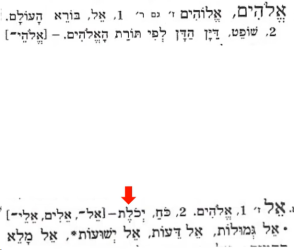- El is a generic noun meaning 'God' as far as I know, but some seem to treat it as a proper name for a specific God?
Actually, from a linquistic point of view the word el (אל) doens't mean "god." First, the Hebrew language doesn't have capital letters, so there is no such thing as el vs. El or god vs. God. It doesn't exist. You could literally create a translation into English with all lower cases letters and not have a problem with a term that in the ancient Hebrew was not a proper name.
Further, in the linqustic sphere all ancient Hebrew terms are derived from 3 letter roots known as a shoresh (a root). This means that all words that derive from a 3 letter root receives its meaning from the three letter root. That being said, the term el (אל) is derived from the following.
Thus, in ancient Hebrew the term el (captital or lower case) was used to describe ANYTHING or ANYONE that either a) had power/strength, or b) that people claimed or ascribed to have strength. Thus, according to the Torah a person, animal, inanimate object, or a concept that either has power or strength or that people consider to have power or strength. There is no intrinsic connection the concept of deity to the word. A person can decide that a particular mighty thing, person, etc. deserves their worship but it doesn't mean they do so because of the word el.
Be aware that the claim from the Torah is that Hashem created everything, including the concept of creation itself, and Hashem was not created by something else, not with something else, and not subject to anything (included what Hashem created). Thus, for that reason a term like (אל) can be used because you are talking about something more powerful than everything in reality. Further to this point, the Hebrew text of the Tanakh sometimes calls Hashem (אל עליון) or loosely translated "The highest of all powers." Denoting that even if you want to call the sun, moon, stars, etc. by the term el, at the end of the day Hashem created all of that.
Now, concerning the Canaanite statues that have been found with designation el to them. You have to go back to the linquistics and what I mentioned before. Of course a statue with the term el transcribed on it can be called an "el" if some human being decides that there is power there somehow. Is it possible that someone considered, for that statue, that its proper name was "el"? It is possible, but again if they did it still begs the question - if they created a statue and it represents a deity what kind of power does the statue have? If it has a power, which one? If it is powerful why did the person have to create the statue in the first place?
That being said, there is a concept found in this part of the world that basically claims that when a person takes a statue (or any material item for that matter) and worships it they are not claiming that the statue "created the universe/reality." Obviously, if a person created the statue then the statue couldn't have craeted the universe. Yet, the idea that some had/have is that they are taking a particular power in the universe and harnessing it by way of the created object. The term focusing could also be used since the statue because an element of focus for something they potentially can't see or harness otherwise. It would be like me wanting to harness the power of thermodynamics when I was in university trying to pass my engineering course load and creating a statue/symbol that I use to focus my attention/or harness the power of thermodymnamics. Of course, if this were my goal I could only do it symbolically or conceptually. There is no way for me to package the physical reality that we describe as thermodynamics and place all of that into a statue or a material item.
Lastly, going back to the critical POV you have to aware of the following.
- The ancient Canaanites left very little information to describe the vast majority of their ideas.
- Western scholars often have to use non-Canaanite sources to understand the huge gaps that exist in ATTEMPTING to understand a dead culture like the Canaanite culture.
- Jewish texts are one of the ways that scholars attempt to address this gap because we Jews descend from people who had contact with the Canaanites.
- It is widely understood that the Canaanites didn't hold by concepts held in modern western thought and thus, ideas like religions and gods in the way that westerners understand them don't appear to have existed thousands of years ago amongt the Canaanites.
The following may help in understanding what I mean.
I addressed other scholarly views on this in this thread.
I plan on making this into a reference thread. That way I don't have to repeat the same information or better yet allow me to refer others to this. The first point I would like to make is about the English term "Hebrew" and how it can be confused some incorrect "westernized" concepts. There was...
www.religiousforums.com



